
This legal study, carried out with the help of Fidal and the support of DEFI, dissociates the operating mode chosen by the retailer. It can be a BtoC or CtoC model, which implies the use of an intermediation platform on the web. “This distinction regarding the quality of the seller is fundamental because the sale does not obey the same regime depending on whether the seller is a professional or a simple consumer, underlines the Alliance du Commerce. The professional seller is indeed bound by more restrictive rules and obligations than the simple consumer seller”.
On the other hand, the choice of the distribution channel also defines the legal obligations of the brand. “The applicable rules will be different depending on whether the sale is made via an intermediation platform, in a physical store or in the form of a deposit-sale.
Contract with the service provider, tax regulations, general sales conditions, safety obligation… So many precise elements swept by this study, which also raises the subject of labeling. The retailer is thus obliged to mention the second-hand nature of the products sold (in the store by a legible sign near to the items in question), but the indication of the composition of the textile fibers is not compulsory, contrary to new clothes.
Offering second-hand clothes to customers is part of the CSR policy of retailers, and also allows them to attract and retain consumers who are increasingly fond of this type of responsible purchasing. France will have more than 15 million second-hand buyers in 2020, according to Kantar data, which estimates the weight of the French second-hand fashion market at €1.16 billion last year (i.e. 9.3% of French clothing expenditure).
